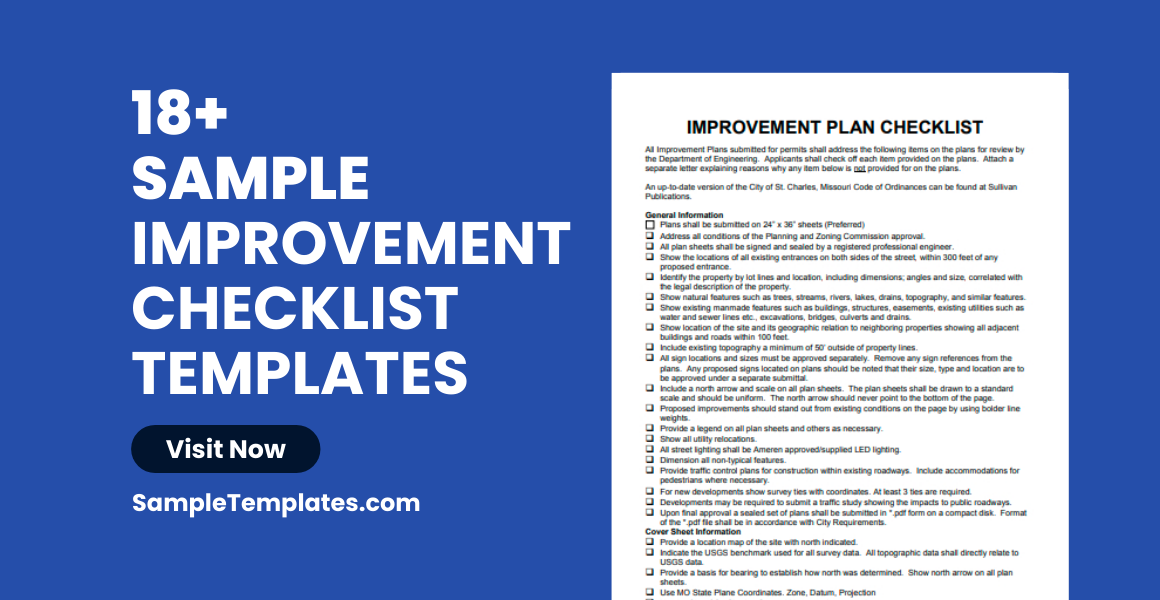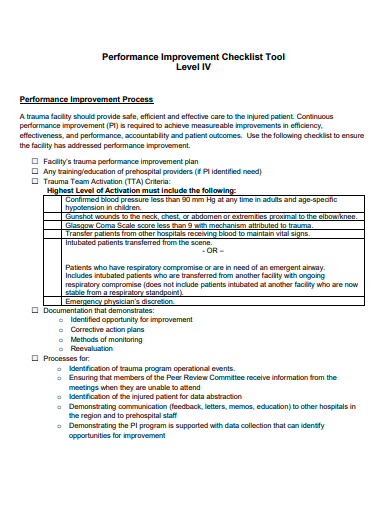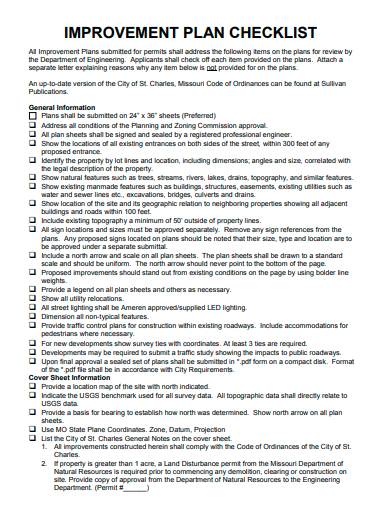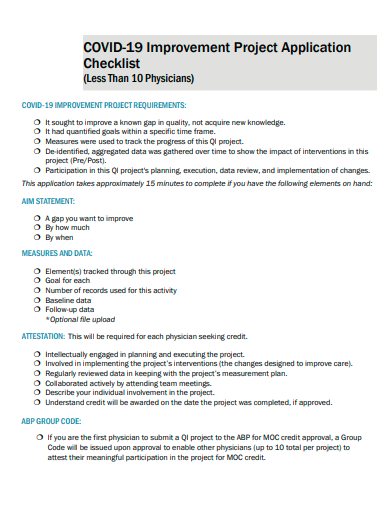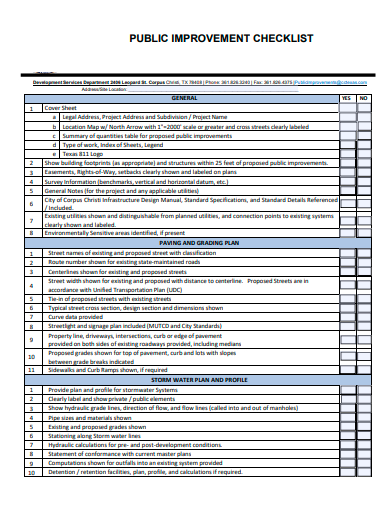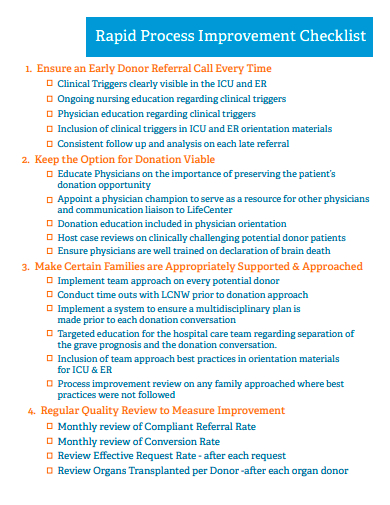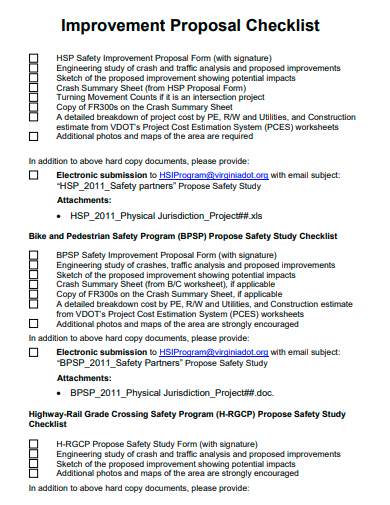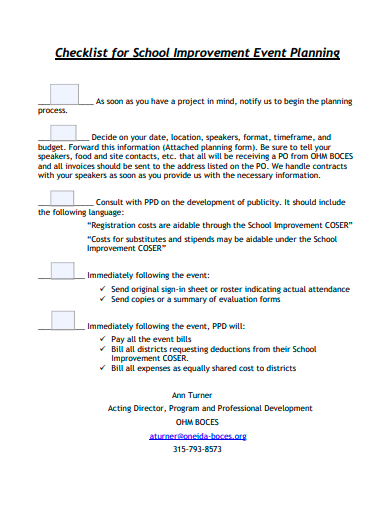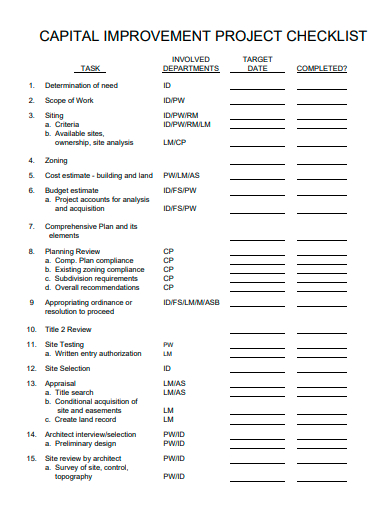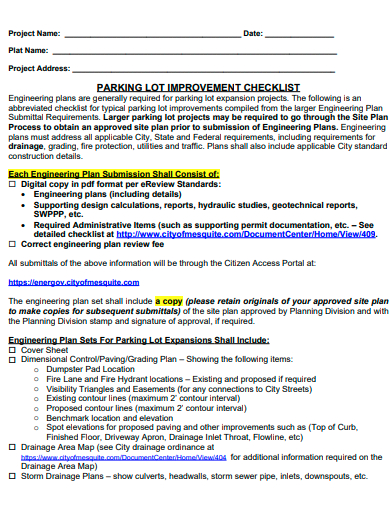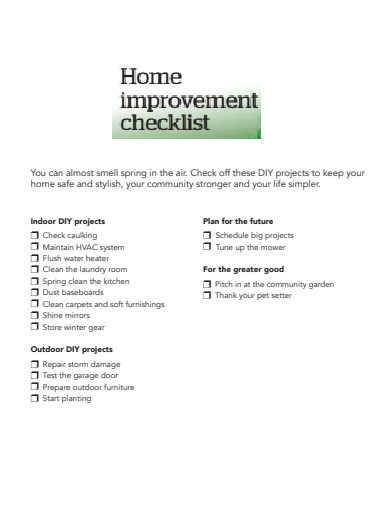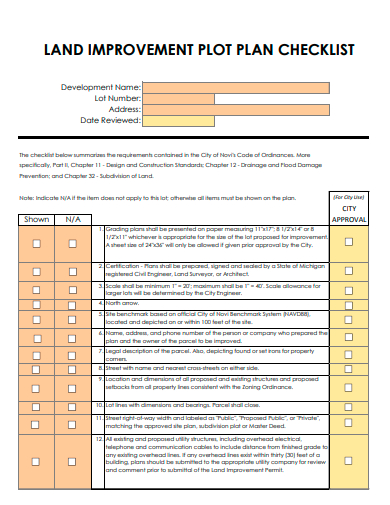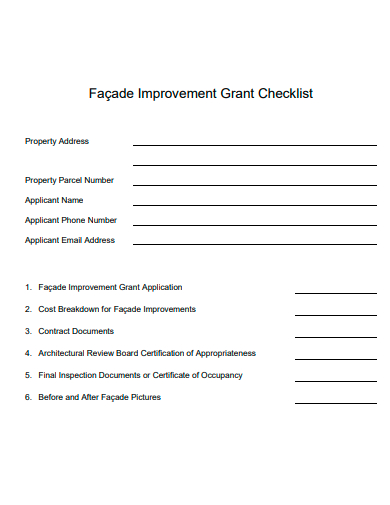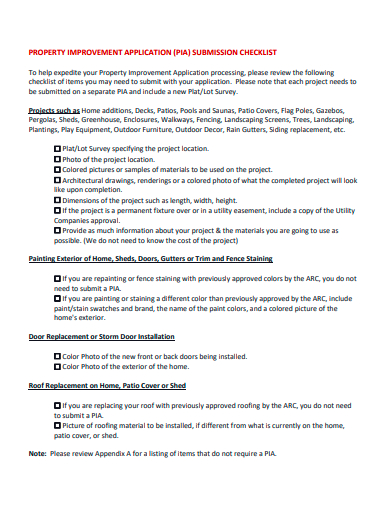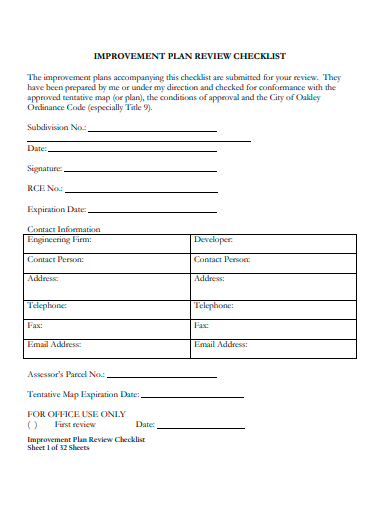In today’s fast-paced world, continuous self-betterment is pivotal. Our ‘Improvement Checklist’ serves as a comprehensive guide for those seeking growth in personal and professional domains. Packed with actionable steps and tailored advice, this sample checklist ensures you stay on track with your goals. Whether you’re a novice just starting your journey or a seasoned expert looking for a refresher, our checklist is your roadmap to success. Dive in and elevate your potential.
18+ Improvement Checklist Samples
1. Sample Customer Service Improvement Checklist Template
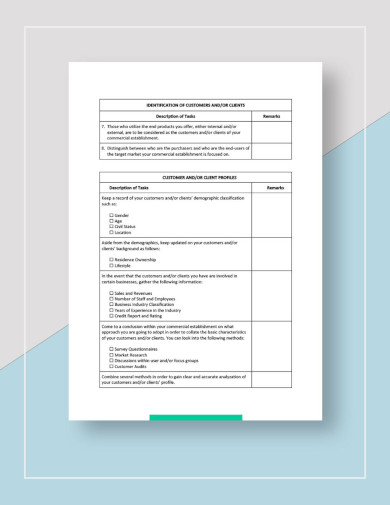
2. Sample Checklist Template
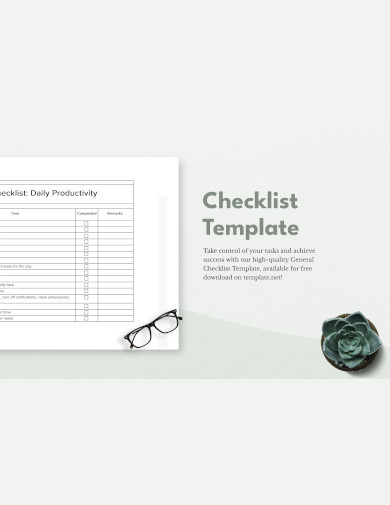
3. Basic Checklist Template
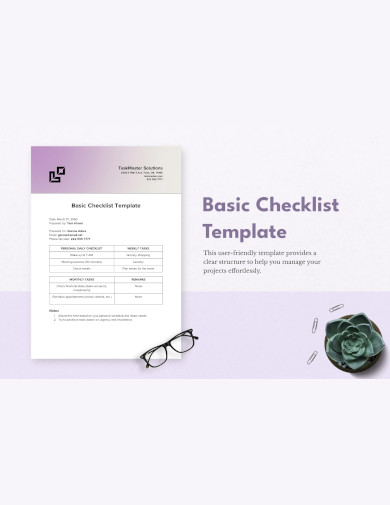
4. Formal Checklist Template
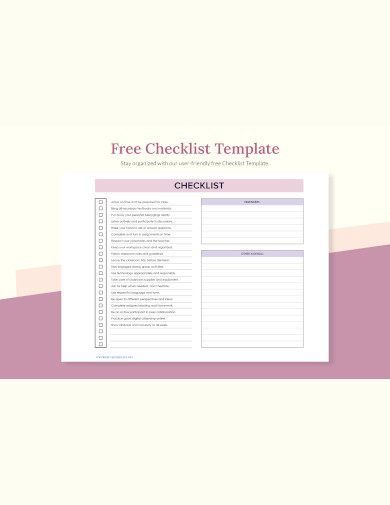
5. Printable Checklist Template
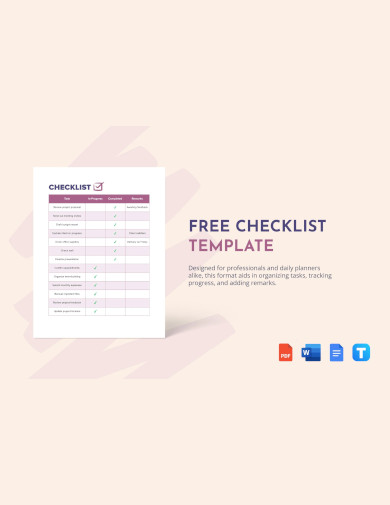
What is an Improvement Checklist?
An Improvement Checklist is a structured tool designed to guide individuals, teams, or organizations through a process of enhancing and refining specific aspects, projects, or procedures. By delineating clear steps, goals, and areas of focus, this printable checklist ensures that all potential improvements are systematically identified and addressed, ensuring a comprehensive approach to betterment.
The essence of an Improvement Checklist lies in its ability to break down the broader goal of “improvement” into actionable, tangible steps. Whether you’re looking at enhancing a business process, refining personal habits, or improving product quality, the checklist serves as a roadmap, ensuring no stone is left unturned in the pursuit of excellence. You can also see more templates like Process Checklist Samples.
Applications of Improvement Checklists
- Personal Development: Individuals can use these checklists to identify areas of personal growth, such as skills they want to learn or habits they aim to break.
- Professional Settings: Organizations often employ improvement checklists to refine workflows, enhance employee performance, or implement best practices.
- Project Management: Such checklists can be invaluable in evaluating a project’s status and identifying areas that need refining or optimization.
- Product Development: Companies might utilize an improvement checklist to ensure a product meets all quality and performance evaluation standards before launch.
Components of an Effective Improvement Checklist
- Clearly Defined Objectives: Every improvement initiative should start with a clear understanding of what needs enhancement. This serves as the foundation of the checklist.
- Identification of Current Challenges: Recognize the pain points, issues, or challenges in the current system or process.
- Potential Solutions: List down possible solutions or strategies to address the identified challenges.
- Action Steps: Break down each solution into actionable steps to ensure clarity in execution.
- Resources Required: Identify and list any tools, training, or resources necessary to implement the improvements.
- Metrics and KPIs: Establish measurable metrics to track the effectiveness of implemented improvements.
- Feedback Mechanism: Ensure there’s a system in place for gathering a sample feedback on the improvements made.
Benefits of Using an Improvement Checklist
- Structured Approach: It offers a clear sample roadmap, ensuring that the improvement process is systematic and thorough.
- Accountability: Assigning tasks or items to specific individuals or teams ensures accountability, making it more likely that the tasks will be executed.
- Measurability: Having a written record allows for tracking and measuring progress over time.
- Efficiency: By ensuring all bases are covered and the process is streamlined, the checklist promotes efficiency.
Challenges in Implementing an Improvement Checklist
- Resistance to Change: Humans are creatures of habit. Introducing changes, even if they’re for the better, can meet resistance.
- Resource Constraints: Some improvements might require substantial resources – be it time, money, or manpower.
- Overwhelming Ambition: Trying to change too much too quickly can be counterproductive. It’s crucial to balance ambition with feasibility. You can also see more templates like Service Checklist Samples.
Types of Improvement Checklist
Improvement checklists can be applied across various domains, industries, and personal growth areas. Their versatility is evident in how they can be tailored to meet the unique requirements of each specific context. Here, we delve into the different types of improvement checklists that can be encountered and their specific applications.
1. Business Process Improvement (BPI) Checklist
Aimed at enhancing operational efficiency in a business setting, this checklist focuses on:
- Process Mapping: Identifying and detailing each step of a specific business process.
- Waste Identification: Spotting unnecessary steps or redundancies.
- Recommendations: Proposing more efficient methods or tools.
- Performance Metrics: Defining measures to evaluate the improvement’s success.
2. Product Quality Improvement Checklist
This is pivotal for businesses aiming to enhance the quality and performance of their products:
- Product Assessment: Evaluating the current state of the product.
- Feedback Collection: Gathering user feedback to identify pain points.
- R&D Recommendations: Suggesting research analysis and development interventions.
- Quality Assurance Metrics: Setting benchmarks for product quality.
3. Health and Safety Improvement Checklist
Used often in industries where safety is crucial, such as construction or manufacturing:
- Safety Audit: Identifying potential hazards in the workplace.
- Equipment Review: Checking the condition and safety of equipment.
- Training Sessions: Educating employees on safety protocols.
- Compliance Measures: Ensuring alignment with safety regulations.
4. Environmental Improvement Checklist
For organizations aiming to reduce their environmental footprint, this checklist covers:
- Environmental Audit: Evaluating the company’s current environmental impact.
- Waste Management: Proposing waste reduction and recycling methods.
- Sustainable Practices: Recommending eco-friendly operations.
- Monitoring Indicators: Tracking the company’s environmental improvement over time.
5. Educational Improvement Checklist
In the realm of education, whether it’s for institutions or individual educators:
- Curriculum Review: Evaluating the current educational content.
- Teaching Methodologies: Reflecting on the teaching approaches used.
- Feedback Mechanism: Creating platforms for student feedback.
- Continuous Development: Encouraging educators’ ongoing training and growth.
6. Technology and IT Improvement Checklist
In the fast-paced world of IT and technology:
- Infrastructure Audit: Checking the current state of IT infrastructure.
- Security Assessment: Identifying potential vulnerabilities.
- Upgrade Recommendations: Suggesting software or hardware enhancements.
- Performance Metrics: Monitoring system speed, uptime, and other critical indicators.
7. Financial Improvement Checklist
For businesses and individuals looking to optimize their financial health:
- Financial Review: Analyzing current financial standings.
- Debt Management: Outlining strategies for debt reduction.
- Investment Opportunities: Highlighting potential areas for financial growth.
- Budgeting and Forecasting: Planning for future financial health.
6. Sample Performance Improvement Checklist Template
7. Sample Improvement Plan Checklist Template
8. Sample Improvement Project Application Checklist Template
9. Sample Public Improvement Checklist Template
10. Sample Rapid Process Improvement Checklist Template
11. Sample Improvement Proposal Checklist Template
12. Sample School Improvement Event Planning Checklist
13. Sample Capital Improvement Project Checklist Template
14. Sample Parking Improvement Checklist Template
15. Sample Home Improvement Checklist Template
16. Sample Land Improvement Plan Checklist Template
17. Sample Improvement Grant Checklist Template
18. Sample Property Improvement Application Submission Checklist
19. Sample Improvement Plan Review Checklist Template
How do you Create an Improvement Checklist?
Continuous improvement is a cornerstone of success in any endeavor. Whether it’s a business aiming to enhance its processes or an individual trying to better their skills, having a structured approach can work wonders. An improvement checklist is a simple yet effective tool to aid in this journey. You can also see more templates like Improvement Plan Samples. Below is a step-by-step guide to creating an improvement checklist tailored to your needs:
1. Identify the Need for Improvement
Start by recognizing the areas that require enhancement. This could be anything from a specific skill you want to develop, a process that needs refining, or even a habit you want to cultivate. Spend some time reflecting on what’s working and what’s not. Feedback from peers, mentors, or customers can also provide valuable insights at this stage. Remember, the goal is to pinpoint areas where change can lead to significant growth or efficiency.
2. Set Clear and Measurable Objectives
Once you’ve identified the areas needing improvement, define clear objectives for each. It’s crucial that these sample objectives are both specific and measurable. For instance, instead of saying, “I want to become better at time management,” aim for, “I want to reduce my task completion time by 20% in the next three months.” Having measurable objectives not only offers a clear path forward but also makes it easier to track progress.
3. Break Down Tasks into Manageable Steps
Improvement can often feel overwhelming when looked at as a monumental task. However, breaking it down into smaller, actionable steps can make the journey more manageable and less daunting. For each objective, list down a series of steps or actions that will help you achieve it. For instance, if your objective is to improve your digital marketing skills, steps might include “Complete an online course on digital marketing,” “Spend 30 minutes a day reading industry blogs,” or “Attend a digital marketing seminar.”
4. Allocate Time and Resources
Any improvement effort requires a commitment of time and sometimes, resources. For each task in your checklist, allocate a specific timeframe. Decide when you’ll start, the time you’ll dedicate daily or weekly, and when you aim to complete it. If resources like books, courses, or tools are needed, Sample list them alongside. This ensures that once you embark on the task, you’re fully equipped to see it through.
5. Review and Adjust Periodically
The path to improvement isn’t always linear. As you progress, you might find that some tasks need more time, certain methods aren’t working, or new challenges arise. It’s essential to periodically review your checklist, assess your progress, and make adjustments as needed. This not only keeps your improvement journey on track but also ensures that the checklist remains relevant to your evolving needs.
In Conclusion, an improvement checklist is more than just a list; it’s a strategic tool driving forward momentum. In our pursuit of betterment, it offers a structured and systematic approach, ensuring that our efforts are directed, measurable, and effective. Whether you’re refining a personal skill, enhancing a project, or driving organizational change, an improvement checklist can be the guiding light on your path to excellence.
Related Posts
FREE 18+ Facilitator Checklist Samples in MS Word | Google Sheets | PDF
FREE 18+ Complaint Checklist Samples in MS Word | Google Sheets | PDF
FREE 18+ Internship Checklist Samples in MS Word | Google Docs | PDF
FREE 18+ Statement Checklist Samples in MS Word | Google Sheets | PDF
FREE 20+ Voluntary Checklist Samples in MS Word | Google Sheets | PDF
FREE 18+ Summary Checklist Samples in MS Word | Google Sheets | PDF
FREE 14+ Sponsorship Checklist Samples in MS Word | MS Excel | PDF
FREE 18+ Conference Checklist Samples in MS Word | Google Sheets | PDF
FREE 17+ Lesson Checklist Samples in MS Word | Google Sheets | PDF
FREE 18+ Progress Checklist Samples in MS Word | Google Docs | PDF
FREE 18+ Enrollment Checklist Samples in MS Word | Google Docs | PDF
FREE 18+ Graduation Checklist Samples in MS Word | Google Sheets | PDF
FREE 15+ Consent Checklist Samples in MS Word | Google Sheets | PDF
FREE 18+ Submission Checklist Samples in MS Word | Google Docs | PDF
FREE 18+ Request Checklist Samples in MS Word | MS Excel | PDF
